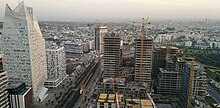Portal:Business
The Business and Economics Portal Business is the practice of making one's living or making money by producing or buying and selling products (such as goods and services). It is also "any activity or enterprise entered into for profit." A business entity is not necessarily separate from the owner and the creditors can hold the owner liable for debts the business has acquired. The taxation system for businesses is different from that of the corporates. A business structure does not allow for corporate tax rates. The proprietor is personally taxed on all income from the business. A distinction is made in law and public offices between the term business and a company such as a corporation or cooperative. Colloquially, the terms are used interchangeably. (Full article...) Economics (/ˌɛkəˈnɒmɪks, ˌiːkə-/) is a social science that studies the production, distribution, and consumption of goods and services. Economics focuses on the behaviour and interactions of economic agents and how economies work. Microeconomics analyses what is viewed as basic elements in the economy, including individual agents and markets, their interactions, and the outcomes of interactions. Individual agents may include, for example, households, firms, buyers, and sellers. Macroeconomics analyses the economy as a system where production, distribution, consumption, savings, and investment expenditure interact, and factors affecting it: factors of production, such as labour, capital, land, and enterprise, inflation, economic growth, and public policies that have impact on these elements. (Full article...) Selected articleThe slate industry in Wales began during the Roman period when slate was used to roof the fort at Segontium, modern Caernarfon. The slate industry grew slowly until the early 18th century, from when it expanded rapidly and reached its peak output in the late 19th century, at which time the most important slate producing areas were in north-west Wales. These included the Penrhyn Quarry near Bethesda, the Dinorwig Quarry near Llanberis, the Nantlle Valley quarries and Blaenau Ffestiniog, where the slate was mined rather than quarried. Penrhyn and Dinorwig were the two largest slate quarries in the world, and the Oakeley mine at Blaenau Ffestiniog was the largest slate mine in the world. The Great Depression and the Second World War led to the closure of many smaller quarries, and competition from other roofing materials, particularly tiles, resulted in the closure of most of the larger quarries in the 1960s and 1970s. Slate production continues on a much reduced scale. Selected image
Selected economyThe economy of Morocco is considered a relatively liberal economy, governed by the law of supply and demand. Since 1993, in line with many Western world changes, Morocco has followed a policy of privatisation. Morocco has become a major player in African economic affairs, and is the 5th largest African economy by GDP (PPP). The World Economic Forum placed Morocco as the most competitive economy in North Africa, in its African Competitiveness Report 2014–2015. The economic system of the country is characterised by a large opening towards the outside world. In the Arab world, Morocco has the second-largest non-oil GDP, behind Egypt, as of 2017. Since the early-1980s, the Moroccan government has pursued an economic programme toward accelerating economic growth with the support of the International Monetary Fund, the World Bank, and the Paris Club of creditors. From 2018, the country's currency, the Moroccan dirham, is fully convertible for current account transactions; reforms of the financial sector have been implemented; and state enterprises are being privatised. (Full article...) Selected quote"As every individual, therefore, endeavours as much as he can both to employ his capital in the support of domestic industry, and so to direct that industry that its produce may be of the greatest value; every individual necessarily labours to render the annual revenue of the society as great as he can. He generally, indeed, neither intends to promote the public interest, nor knows how much he is promoting it. By preferring the support of domestic to that of foreign industry, he intends only his own security; and by directing that industry in such a manner as its produce may be of the greatest value, he intends only his own gain, and he is in this, as in many other cases, led by an invisible hand to promote an end which was no part of his intention. Nor is it always the worse for the society that it was no part of it. By pursuing his own interest he frequently promotes that of the society more effectually than when he really intends to promote it. I have never known much good done by those who affected to trade for the public good. It is an affectation, indeed, not very common among merchants, and very few words need be employed in dissuading them from it."
TopicsRelated WikiProjectsDid you know (auto-generated) -
On this day in business history
General imagesThe following are images from various business-related articles on Wikipedia.
More did you know
Business news Wikinews Economy and business portal
|









































